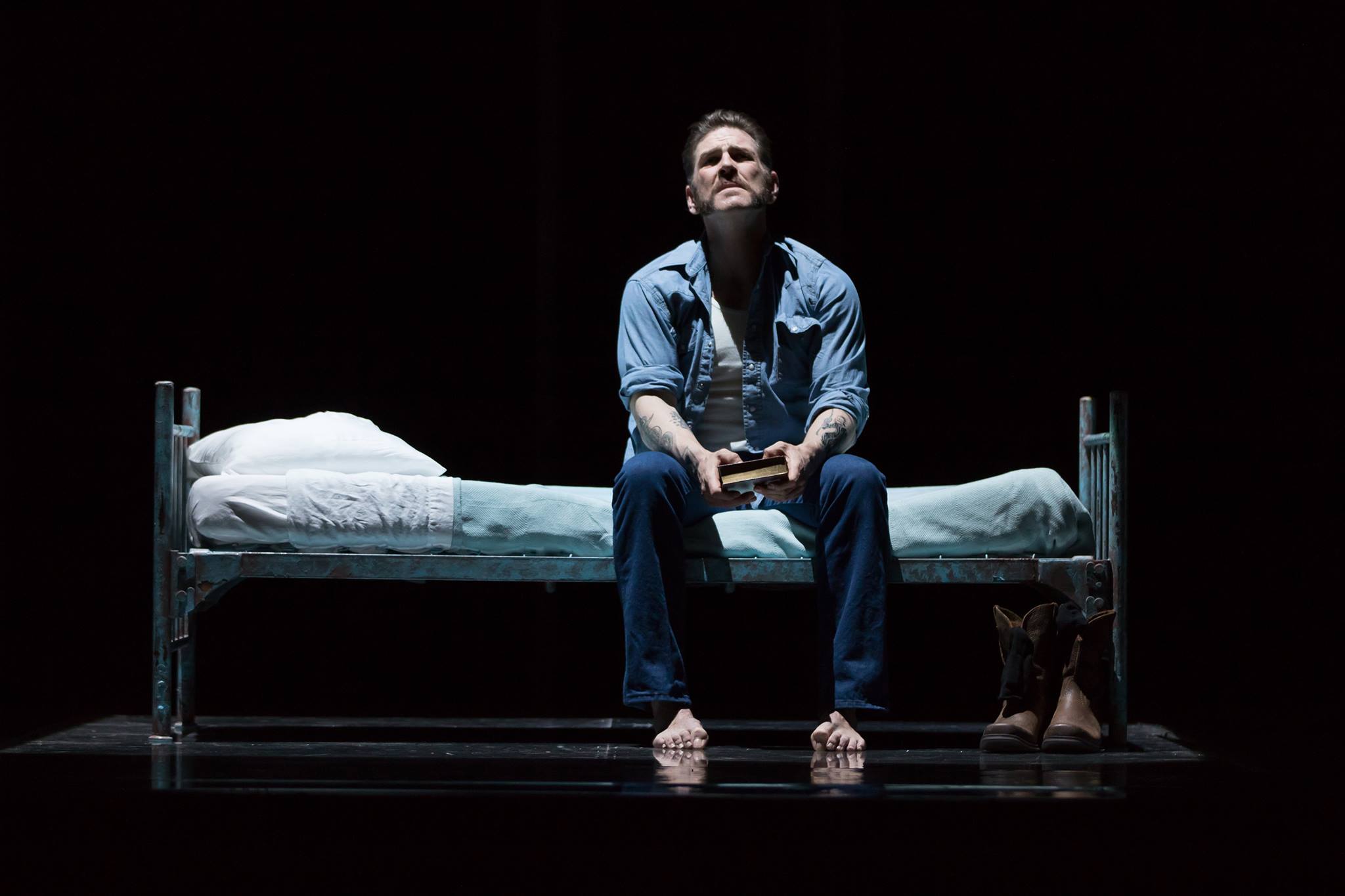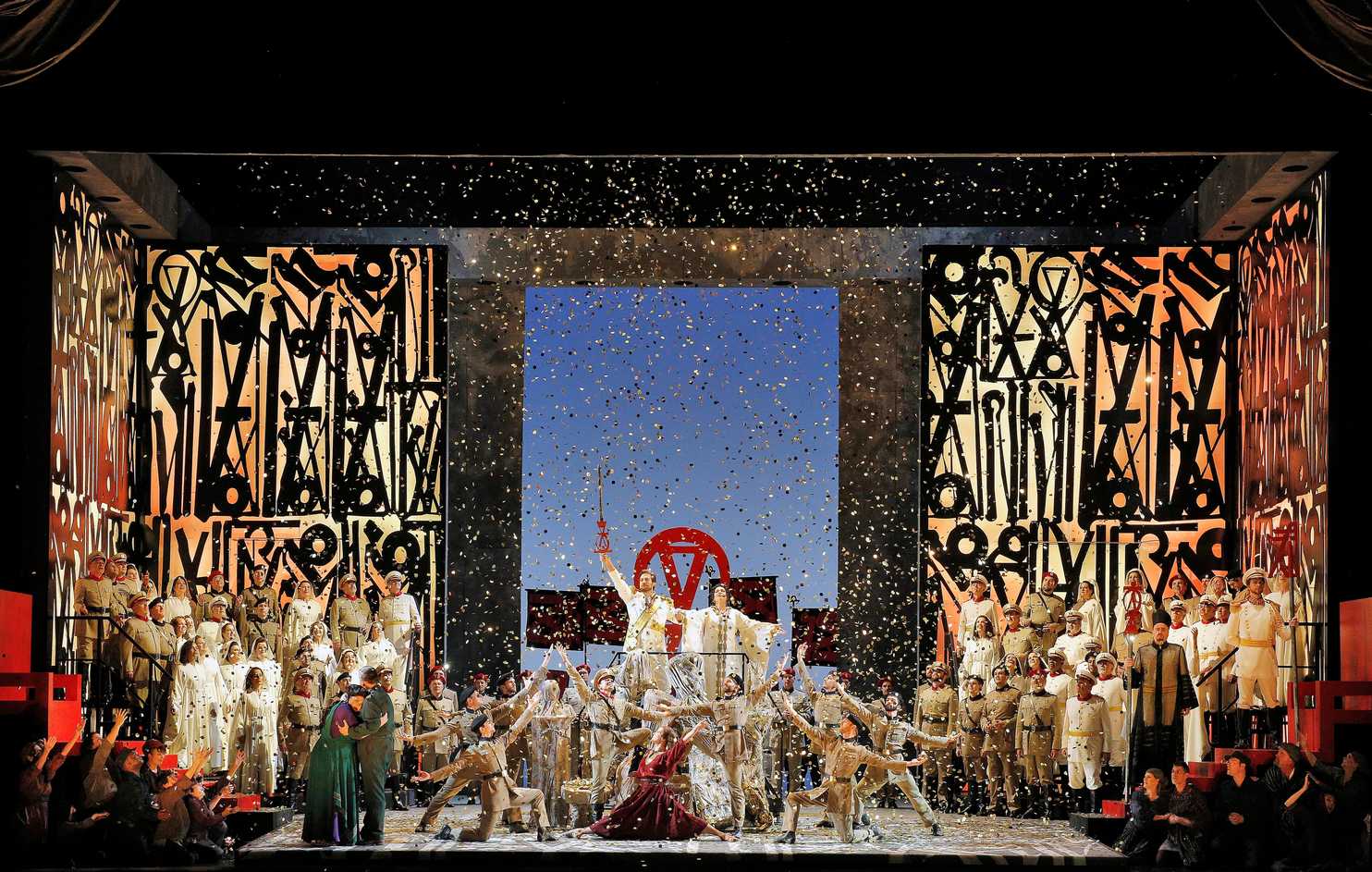WNO: La fille du regiment

She didn't have a lot to do, but that didn't stop Ruth Bader Ginsburg from memorably stealing the show during Saturday night's opening performance of Washington National Opera's new production of Donizetti's La fille du regiment (The Daughter of the Regiment). No doubt the idea of casting the Notorious RBG as the Duchess of Krakenthorp, even if only for one night, was a small stroke of genius that could only happen in DC. It's a small, non-singing comedic role, often performed by an aging diva or broadway star, expanded in most contemporary productions to deliver some topical jokes at the opera's halfway mark.
Ruth Bader Ginsburg and Deborah Nansteel in Washington National Opera's The Daughter of the Regiment.
When the curtain rose for the second act Ginsburg was already on stage, concealed from view in one of two canopied wing chairs facing away from the audience, her feet dangling high above the floor (Deborah Nansteel as the Marquise of Berkenfield was in the other). When the time came for her character's entrance, supers spun the chairs around to face the audience, and the audience went nuts. I can only think of two people in entire the world who might have drawn a larger, louder, more enthusiastic response: Hillary Clinton and Betty White.
Perhaps a Clinton victory would have made the moment all the more gratifying and reverberant, or maybe it was Clinton's loss that added some cathartic fuel to the unbelievably robust ovation, which brought the show to a full stop. Speaking in English (the opera is in French) and using a body mic, she delivered her lines with the aid of a crib sheet in her lap while remaining seated, with a measured, reserved sarcasm just barely concealing her enthusiasm. Certainly the lines were written to reflect a different outcome than Tuesday's shocker, and jokes that might have come off as triumphant barbs ("Is it any wonder that its most valorous leaders have been women?”) had a tinge of resigned irony about them. Nevertheless, she held the audience firmly in the palm of her hand during every second of the scene, which ended all too soon. Still, her best moment came later on when she interjected a mocking “Quel scandale!” at a particularly well-timed moment.
Fille is a frothy comedy which debuted in 1840, and by contemporary standards the plot is an archaic absurdity, even if it resembles today's romcoms: as a baby, Marie was found by a French regiment and raised within it to become their vivandière, a woman who provisions the soldiers with wine and other basics (but not those kind of basics) ; now a young woman, her regiment arrives as an occupying force in a Tyrolean town (what? why? who cares!), causing great fear and concern among the locals; the men of the regiment find Tonio the Tyrollean sneaking about and capture him, thinking he's some kind of spy; Marie interjects to save him, telling the story of how he saved her from falling off a cliff; Tonio declares his love for her, a love so deep he'll join the regiment just to be near her; their true love finds a fly in the ointment in the form of the Marquise of Berkenfield, who, it turns out, claims Marie to be her niece and takes her away to be groomed as a proper woman. Intermission. At the beginning of the second act there's much comedy mined from Marie's complete failure at her lady lessons, and the Marquise plots with the Duchess to marry off Marie to a Duke. Tonio and the regiment arrive at the house; Tonio makes a pitch for Marie's hand, and the Marquise says too late, off you go; the Marquise then confides to Sulpice that Marie is actually her own daughter, and she's looking forward to handing down her fortune to the girl through the arranged marriage. Can Sulpice help her? Yes, of course, he'll do all he can. When it comes time to sign the marriage contract Marie freaks out. The men of the regiment claim she's their daughter as much as the Marquise's. At the very last minute the Marquise relents and allows Marie and Tonio to marry. The end.
Lisette Oropesa, Kevin Burdette, and Lawrence Brownlee.
Although there are countless variations of this story, in the right hands Donizetti's version still manages to be one of the standard rep's most delightful comedies, and for those so inclined, it's not a stretch to see Marie as a feminist prototype. Director and choreographer Robert Longbottom downplays that latter aspect in favor of keeping things humming along in a traditional staging that leans heavily on the charm and vocal skills of its leads: Lisette Oropesa as Marie; Lawrence Brownlee as Tonio; and Kevin Burdette as Sulpice (Andriana Chuchman and Andrew Stenson takeover for Oropesa and Brownlee for three performances on 11/13, 11/17, & 11/19).
Marie is such a winning character it seems like it wouldn't take all that much to succeed in the role; find a good soprano with some decent acting chops and let Donizetti do the rest. It's not that simple of course -- singing Donizetti requires some serious skill, and Oropesa, one of today's most promising young singers, is a natural for it. Still, there was a slight sense she was holding back a bit on opening night, and I suspect later performances (without the distraction of RBG) will be even more satisfying. Tonio is the more difficult role, and with it comes the famously tricky challenge of singing nine high C's during the aria "Ah! mes amis." Brownlee nailed it, triumphantly dispatching the final one somewhere on the other side of the Potomac. Kevin Burdette could be slightly more curmudgeonly as Sulpice, but his is still a fine performance. Mezzo-sporano Deborah Nansteel, a recent graduate of the Domingo-Cafritz Young Artist Program, delightfully inhabited every aspect of the Marquise role with complete confidence. Cindy Gold performs the role of the Duchess for the remainder of the run.
First-timers to this opera will find much to love about it from start to finish. For those who've seen it before, the first act might seem a tad prosaic, but the second pays off handsomely, framed with understated opulence by James Noone's set and beautiful lighting by Mark McCullough. Christopher Allen's conducting kept things brisk and supportive, but I question the effectiveness of leaving the curtain down during the overture. On the one hand it's a nice return to tradition and spares the audience from being subjected to a fabricated beginning. On the other hand it feels like a very long seven minutes, and there's a reason no one's ever bothered to record an album of Donizetti overtures.
Washington National Opera's The Daughter of the Regiment is now running nightly at the Kennedy Center through November 20.
All photos by Scott Suchman.
lf you liked this, like A Beast in a Jungle on Facebook for more.







